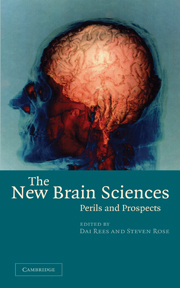Book contents
- Frontmatter
- Contents
- List of contributors
- Part I Introduction: the new brain sciences
- Part II Freedom to change
- 1 Do we ever really act?
- 2 The definition of human nature
- 3 Consciousness and the limits of neurobiology
- 4 Mind metaphors, neurosciences and ethics
- 5 Genetic and generic determinism: a new threat to free will?
- Part III Neuroscience and the law
- Part IV Stewardship of the new brain sciences
- Part V Conclusion
- References
- Index
2 - The definition of human nature
Published online by Cambridge University Press: 08 August 2009
- Frontmatter
- Contents
- List of contributors
- Part I Introduction: the new brain sciences
- Part II Freedom to change
- 1 Do we ever really act?
- 2 The definition of human nature
- 3 Consciousness and the limits of neurobiology
- 4 Mind metaphors, neurosciences and ethics
- 5 Genetic and generic determinism: a new threat to free will?
- Part III Neuroscience and the law
- Part IV Stewardship of the new brain sciences
- Part V Conclusion
- References
- Index
Summary
Our definition of human nature gives us a conceptual foundation for our ideas about human rights, individual responsibility, and personal freedom. These ideas were originally derived from the liberal humanities, and are ultimately the secular modern descendants of the concept of a ‘natural law’ based on earlier religious and philosophical traditions. In this context, this is not a trivial exercise. It provides a conceptual foundation for our legal system, as well as our constitutional protections of human rights. Since the time of Charles Darwin there have been many attempts to define human nature in more scientific terms. In effect, this has amounted to an attempt to derive a new kind of natural law, based largely on scientific evidence, and especially on the theory of evolution. Here I am not speaking of Social Darwinism, an earlier intellectual movement that naively tried to extrapolate the laws of natural selection to human society, but of more recent empirical attempts to construct a culturally universal description of the human condition, and to explain it in terms of evolution and genetics.
In such attempts, human nature is usually defined as having been fixed when our species evolved in the Upper Palaeolithic, and this suggests that we have been genetically engineered to survive under the special conditions of late Stone Age civilisation. This raises the disconcerting possibility that human nature might prove to be maladaptive in today's high-tech, fast-moving, urbanised world. On the other hand, the logic leading to this conclusion is not compelling.
- Type
- Chapter
- Information
- The New Brain SciencesPerils and Prospects, pp. 34 - 58Publisher: Cambridge University PressPrint publication year: 2004
- 7
- Cited by



